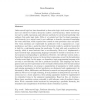Free Online Productivity Tools
i2Speak
i2Symbol
i2OCR
iTex2Img
iWeb2Print
iWeb2Shot
i2Type
iPdf2Split
iPdf2Merge
i2Bopomofo
i2Arabic
i2Style
i2Image
i2PDF
iLatex2Rtf
Sci2ools
118
click to vote
AI
2004
Springer
2004
Springer
Order-sorted logic programming with predicate hierarchy
Order-sorted logic has been formalized as first-order logic with sorted terms where sorts are ordered to build a hierarchy (called a sort-hierarchy). These sorted logics lead to useful expressions and inference methods for structural knowledge that ordinary first-order logic lacks. Nitta et al. pointed out that for legal reasoning a sort-hierarchy (or a sorted term) is not sufficient to describe structural knowledge for event assertions, which express facts caused at some particular time and place. The event assertions are represented by predicates with n arguments (i.e. n-ary predicates), and then a particular kind of hierarchy (called a predicate hierarchy) is built by a relationship among the predicates. To deal with such a predicate hierarchy, which is more intricate than a sort-hierarchy, Nitta et al. implemented a typed (sorted) logic programming language extended to include a hierarchy of verbal concepts (corresponding to predicates). However, the inference system lacks a theor...
| Added | 16 Dec 2010 |
| Updated | 16 Dec 2010 |
| Type | Journal |
| Year | 2004 |
| Where | AI |
| Authors | Ken Kaneiwa |
Comments (0)

